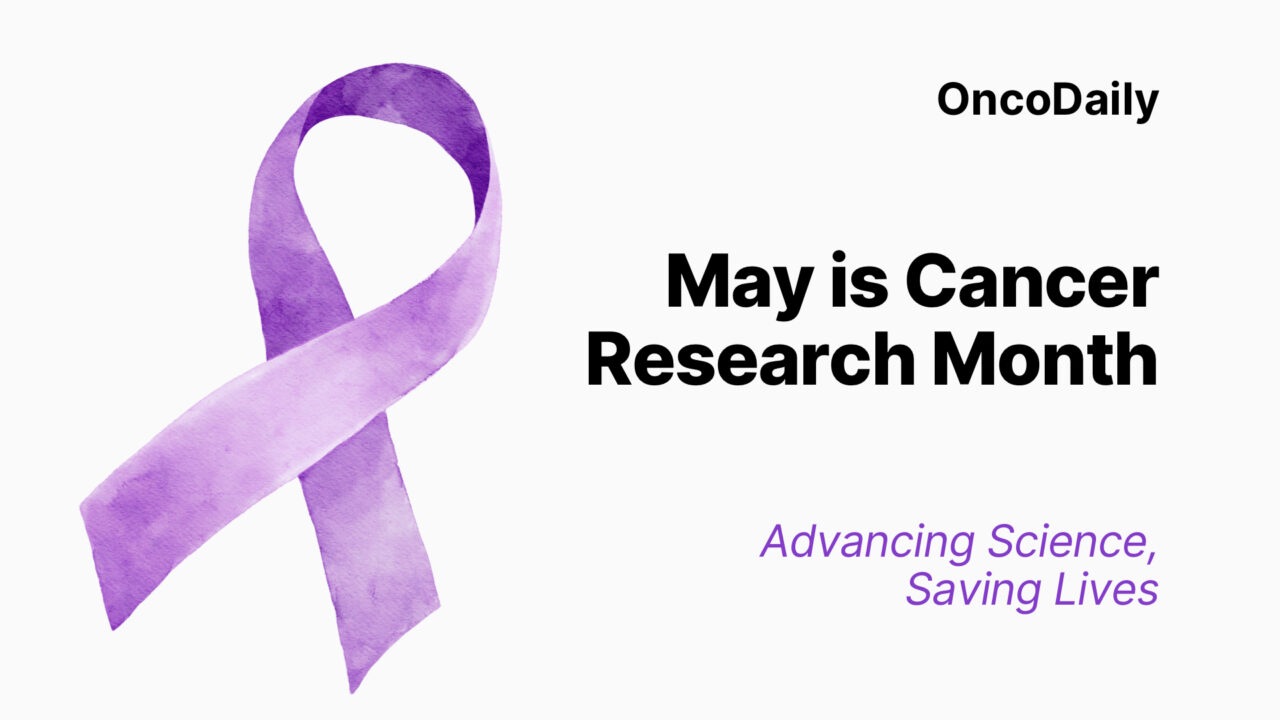
May is Cancer Research Month: Advancing Science, Saving Lives
Every May, we celebrate National Cancer Research Month, recognizing the lifesaving impact of cancer research and the dedication of scientists, clinicians, and patients driving progress forward. The month also includes important oncology observances like Brain Tumor Awareness Month and Bladder Cancer Awareness Month, highlighting the diverse challenges across cancer care. At the center of it all is research, the foundation behind every breakthrough, new therapy, and step toward a cure.
Why Is Cancer Research Month Celebrated?
The primary purpose of National Cancer Research Month is to emphasize the importance of lifesaving cancer research and its impact on millions of lives. It serves as a platform to raise awareness about the progress made in understanding, preventing, diagnosing, and treating cancer, and to underscore the need for continued investment in research to develop new and better treatments.
Thanks to advancements in cancer research, more than 18 million people in the United States and millions more worldwide are living with, through, and beyond their disease. This month-long observance encourages individuals, institutions, and policymakers to unite in advancing research, raising awareness, and ensuring continued federal investment in the fight against cancer.

Who Decided to Celebrate Cancer Research Month?
National Cancer Research Month was initiated and is supported by the American Association for Cancer Research (AACR), the world’s first and largest professional organization dedicated to advancing cancer research. The AACR established this observance to highlight the importance of lifesaving research to the millions of people around the world affected by cancer.
The AACR collaborates with advocacy groups, cancer centers, and research institutions to raise awareness of the high-quality, innovative cancer research happening across the country and around the world during this month.
Since When Is Cancer Research Month Celebrated?
National Cancer Research Month has been observed every May since its inception by the AACR. While the exact year of establishment is not specified in the provided sources, the AACR has been actively promoting this observance to highlight the importance of cancer research and to advocate for continued support and funding.
The Impact of Decades of Research
Over the past 30 years, cancer death rates in the United States have dropped by approximately 33%. This steady decline has been documented in the AACR Cancer Progress Report 2023 (published in Clinical Cancer Research, 2023), highlighting the roles of early detection, improved therapies, and prevention efforts.
Source: Clinical Cancer Research, AACR Cancer Progress Report 2023
Advances in Treatment Modalities
Over the past decade, cancer care has undergone a transformative shift driven by major advances in treatment, diagnostics, and survivorship. From the rise of immunotherapy and targeted therapies to innovations in liquid biopsy and nanomedicine, oncology has entered a new era of precision and personalization. These breakthroughs have improved outcomes and survival rates, particularly in high-income countries. However, global disparities persist, highlighting the ongoing need for equitable access to these innovations. This review summarizes key developments in treatment modalities, early detection, and survivorship, drawing from landmark studies and recent research.
Since the FDA approval of the first immune checkpoint inhibitor in 2011 (Pembrolizumab), immunotherapy has revolutionized cancer treatment, with landmark studies published by Topalian et al. in The New England Journal of Medicine (2015) and by Garon et al. in the Journal of Clinical Oncology (2018).
The rise of genomic profiling and targeted therapies has been detailed by Hyman et al. in Nature Medicine (2019) and by Subbiah et al. in Cancer Cell (2021), with significant advances occurring especially since 2015. Targeted agents for lung cancer (EGFR inhibitors) and breast cancer (HER2-targeted therapies) have significantly improved survival rates.
Emerging research on nanotechnology applications in drug delivery has been published by Zhang et al. in ACS Nano (2022) and by Wang et al. in Advanced Drug Delivery Reviews (2021), highlighting advancements since the early 2020s.
Olaparib, a PARP inhibitor, has transformed treatment for cancers linked to BRCA1/2 mutations. Approved by the FDA in 2014 for ovarian cancer, it has since shown strong efficacy in breast, prostate, and pancreatic cancers. The OlympiAD trial, published by Robson et al. in The New England Journal of Medicine (2017), demonstrated longer progression-free survival in patients with BRCA-mutated breast cancer. Similarly, the SOLO1 follow-up analysis by Moore et al., published in the Journal of Clinical Oncology (2022), confirmed olaparib’s long-term benefit in advanced ovarian cancer. Olaparib’s success highlights the value of genetic testing and targeted therapies in modern cancer care.
Enhanced Early Detection
Advances in cancer diagnostics since 2018 have greatly improved early detection strategies, enabling earlier interventions and better patient outcomes.
Liquid Biopsies
Liquid biopsies, which analyze circulating tumor DNA (ctDNA) in the blood, have become a major focus for non-invasive cancer detection. A key 2020 study in The Lancet Oncology demonstrated that a multi-cancer blood test could detect over 50 cancer types with high specificity (Lancet Oncol. 2020). In 2021, JAMA Oncology reported that such tests could also detect cancer signals up to four years before clinical diagnosis (JAMA Oncol. 2021).
Trephine (Core Needle) Biopsy
Nadda et al. conducted a prospective study published in the European Journal of Medical Research on June 24, 2023, evaluating the role of trephine bone marrow biopsies in diagnosing hematological disorders in an Indian population. The study included 274 patients and demonstrated that trephine biopsy is a valuable diagnostic tool across all age groups. It effectively identified various hematological malignancies, supporting its continued use in clinical settings. The findings emphasize the importance of core biopsies in providing accurate diagnoses, especially when combined with clinical and hematological data.
Fine-Needle Aspiration (FNA) Biopsy
Zheng et al. conducted a systematic review and meta-analysis, published in Frontiers in Oncology on June 21, 2023, evaluating the diagnostic accuracy of ultrasound-guided fine-needle aspiration (US-FNA) and core needle biopsy (US-CNB) for axillary lymph node assessment in women with breast cancer. The study found that US-CNB had a higher sensitivity compared to US-FNA, suggesting that US-CNB may be more effective in accurately diagnosing axillary lymph node metastases in this patient population.
Increased Survivorship
The number of cancer survivors in the U.S. increased from about 3 million in 1971 (when the National Cancer Act was passed) to over 17 million in 2022, as reported by the American Cancer Society in their Cancer Facts & Figures 2023.
Source: Cancer Facts & Figures 2023, American Cancer Society
Global Impact and Challenges
While high-income countries have seen marked improvements, disparities remain worldwide. The British Medical Journal (BMJ) published a 2024 study highlighting challenges in access to novel therapies in low- and middle-income countries.
Source: BMJ, 2024

Get Involved This National Cancer Research Month
Donating to cancer research is a powerful way to support the fight against this disease. Every contribution helps scientists uncover new treatments, develop lifesaving technologies, and move closer to cures. In May, during National Cancer Research Month, your support becomes part of a global movement united by one goal: to save lives through science.
Spotlight on Pediatric Cancer Research
Pediatric cancers, though less common than adult forms, are among the leading causes of disease-related deaths in children. Despite nearly half a million new diagnoses annually, pediatric cancer is often classified as a “rare disease,” which limits funding and prioritization. There are over 200 approved drugs for adult cancers, yet fewer than 30 have been specifically developed for children, highlighting a significant imbalance in treatment options.
OncoThon: A Global Effort to Combat Childhood Cancer
OncoDaily, in collaboration with the International Society of Pediatric Oncology (SIOP), hosts the Global OncoThon—a 24-hour virtual telethon aimed at raising critical funds and awareness for pediatric cancer research. Scheduled annually on February 15, International Childhood Cancer Day, the OncoThon unites individuals and organizations worldwide in a shared mission: to give every child a brighter, cancer-free future.
The OncoThon features a diverse lineup of speakers, including healthcare professionals, researchers, and advocates, who share insights and personal stories to highlight the challenges and advancements in pediatric oncology. Notably, the event has spotlighted the need for specialized funding and research in pediatric oncology, emphasizing that pediatric and adult cancers are fundamentally different and require tailored approaches.
Join the Movement
Your support can make a tangible difference in the lives of children battling cancer. By contributing to pediatric cancer research, you help pave the way for new treatments and hope for families worldwide.
To learn more about the OncoThon and how you can participate or donate, visit the official OncoDaily OncoThon page
Watch highlights and full sessions on YouTube
Donate to the American Association for Cancer Research (AACR)
AACR is the founding organization behind National Cancer Research Month. Donations directly fund cutting-edge cancer research and training programs for the next generation of scientists. Monthly giving through their Sustaining Hope Club helps maintain long-term projects. Learn more or make a gift at the AACR donation portal.
Support the Cancer Research Institute (CRI)
CRI is focused on advancing cancer immunotherapy. Donations support lab research, clinical trials, and public education. You can give one-time, set up a recurring donation, or start your own fundraiser. Visit CRI’s Ways to Give to find your best option.
Contribute to the American Cancer Society (ACS)
ACS funds research and provides crucial services to patients and caregivers. Your donation can help support transportation to treatment, lodging during therapy, and more. Learn how to give at ACS’s official site, where you can also honor a loved one through memorial giving.
Give through the National Cancer Institute (NCI)
While NCI is federally funded, it accepts direct public donations to support fellowships, research equipment, and special programs via the NCI Gift Fund. You can also support research through the purchase of the Breast Cancer Research Stamp.
Other Ways to Help
Beyond monetary donations, you can volunteer, join awareness campaigns, or advocate for increased federal research funding. Fundraisers, educational events, and personal stories shared on social media also make a difference.
This May, whether you donate $5 or $500, your support fuels hope and progress.
Cancer Research’s Most Impactful Funding Stories
Behind every breakthrough in cancer care is a story of bold investment and unwavering commitment. From billion-pound pledges to grassroots partnerships, these recent funding efforts are driving real progress supporting scientists, building new centers, and bringing hope to millions around the world.
BioNTech – £1 Billion Investment in UK Cancer Research
BioNTech, renowned for its role in developing the Pfizer COVID-19 vaccine, announced a £1 billion investment over the next decade to expand its research and development activities in the United Kingdom. This initiative includes establishing new R&D centers in Cambridge and London, focusing on personalized cancer therapies and integrating AI technologies. The UK government is supporting this expansion with up to £129 million in funding.
Texas Children’s Hospital & MD Anderson – $150 Million for Pediatric Cancer Center
The Kinder Foundation donated $150 million to support a joint pediatric oncology program by Texas Children’s Hospital and the University of Texas MD Anderson Cancer Center. This funding will aid in constructing the Kinder Children’s Cancer Center, aiming to become the largest and most comprehensive pediatric cancer care center in the U.S. The center is expected to open in early 2026.
Harvard University – $250 Million for Research Amid Federal Grant Freeze
In response to a suspension of federal grants, Harvard University allocated $250 million from its endowment to sustain research initiatives, particularly in medical science. This move aims to mitigate the impact of over $2.6 billion in lost government funding and ensure the continuity of critical research projects.
American Cancer Society (ACS) – Over $98 Million in New Research Grants
Between August and December 2024, the ACS awarded 245 new or renewed research grants totaling more than $98 million. These grants support investigators across 106 institutions, covering various aspects of cancer research, including prevention, diagnosis, and treatment.
Breast Cancer Research Foundation (BCRF) – $70.3 Million for Global Research
For the 2024-2025 period, BCRF is investing $70.3 million to fund breast cancer research, supporting over 260 scientists across 16 countries. This marks the foundation’s largest annual research program, aiming to advance understanding and treatment of breast cancer worldwide.
Cancer Research Institute (CRI) – $22.7 Million for Immunotherapy Innovations
In the 2024 fiscal year, CRI awarded over $22 million in research grants and fellowships to 64 cancer immunotherapy researchers across 42 institutions in seven countries. These funds aim to propel advancements in cancer immunology and immunotherapy treatments.
AACR Trailblazer Cancer Research Grant Program – $15 Million for Early-Career Scientists
The American Association for Cancer Research (AACR) launched its largest-ever grant program, awarding 15 grants of $1 million each to early-stage and mid-career investigators. This $15 million initiative supports promising cancer research projects over three years.
Lung Cancer Research Foundation (LCRF) – $3.55 Million in New Research Awards
In December 2024, LCRF announced $3.55 million in new research awards, bringing its annual total funding to $3.87 million. These grants support innovative projects aimed at improving lung cancer detection, treatment, and patient outcomes.
Ovarian Cancer Research Alliance (OCRA) – $1 Million Public-Private Partnership
OCRA, in collaboration with the Rivkin Center and Washington State’s Andy Hill Cancer Research Endowment Fund, invested $1 million in ovarian cancer research. This public-private partnership funds investigators pursuing projects in all areas of ovarian cancer research.
The Mark Foundation for Cancer Research – Emerging Leader Awards
The Mark Foundation supports early-career investigators through its Emerging Leader Awards, funding high-impact, high-risk cancer research projects that are distinct from current research portfolios. These grants aim to foster innovation and accelerate breakthroughs in cancer treatment.
Written by Nare Hovhannisyan MD
-
Challenging the Status Quo in Colorectal Cancer 2024
December 6-8, 2024
-
ESMO 2024 Congress
September 13-17, 2024
-
ASCO Annual Meeting
May 30 - June 4, 2024
-
Yvonne Award 2024
May 31, 2024
-
OncoThon 2024, Online
Feb. 15, 2024
-
Global Summit on War & Cancer 2023, Online
Dec. 14-16, 2023
